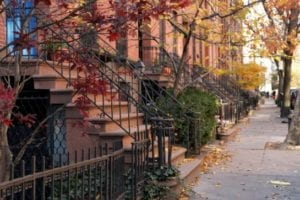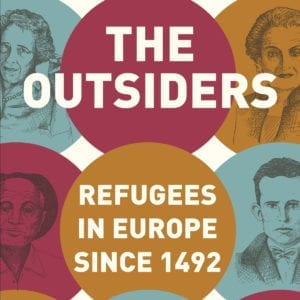 On December 11, 2019, NYU Florence will host a talk with Professor Philipp Ther entitled The Outsiders: Refugees in Europe since 1942. Professor Ther is a Professor of History at the University of Vienna, winner of the 2019 Wittgenstein Prize, and will speak about his new book. Professor Ther will discuss the long history of refugees in modern European history, and will reflect on how that history might shape our understanding of current crises of displacement, at a moment when the movement of labor migrants and refugees has become a deeply polarizing political preoccupation in contemporary Europe.
On December 11, 2019, NYU Florence will host a talk with Professor Philipp Ther entitled The Outsiders: Refugees in Europe since 1942. Professor Ther is a Professor of History at the University of Vienna, winner of the 2019 Wittgenstein Prize, and will speak about his new book. Professor Ther will discuss the long history of refugees in modern European history, and will reflect on how that history might shape our understanding of current crises of displacement, at a moment when the movement of labor migrants and refugees has become a deeply polarizing political preoccupation in contemporary Europe.
NYU Wordpress Theme
Events
10 Years in Tel Aviv








Photos by Avi Duek
NYU Tel Aviv (NYUTA) marked its 10th anniversary earlier this month with a series of events that brought together faculty, students, and administrators from across NYU’s global network, as well as alumni, and members of NYU’s leadership team, including President Andrew Hamilton, and several members of NYU’s Board of Trustees. On November 10th, participants toured Tel Aviv and the surrounding area, and also had the opportunity to meet with NYUTA lecturers, students, and staff.
The group also visited the offices of one of NYUTA’s key internship partners, The Floor, a financial technology company located at the Tel Aviv stock exchange where they met with co-founder, Moises Cohen. Deyang Sun, a senior CAS major in Economics and student at NYUTA, and intern at The Floor, presented to the group his experience working with an international team to create an innovative tool that fosters connections between big banks and startups offering sought-after telecom and cybersecurity expertise. He explained, “this project is very meaningful because on the one hand, it increases the efficiency of the banks, and on the other hand, it also creates business for the Israeli startups.” Having studied away at three of NYU’s global locations, Sun noted that Israel’s thriving entrepreneurial and fintech arena was one of the reasons he chose to weave a fourth study away experience into the final year of his degree.
The tour, led by Benjamin Hary, Professor of Hebrew and Judaic Studies and Site Director of NYUTA, and Zvi Ben-Dor Benite, Associate Vice Chancellor for Global Network Faculty Planning, and professor in NYU’s departments of History and Middle Eastern and Islamic Studies, led a walking tour of Tel Aviv’s Rothschild Boulevard, the old city in Jaffa, and then finished the afternoon at Caesarea, where NYUTA has launched a new program in archaeology. In the evening, the group attended a reception with over 200 members of the NYU Alumni Club of Israel and local partners at the Peres Center for Peace and Innovation in Jaffa.
On day two, the site hosted an international symposium, entitled International Higher Education in the Digital Age. Bringing together leading scholars, educators and administrators from Israel and across NYU’s global network, more than 130 attendees heard from and engaged with speakers who analyzed a number of critical challenges facing higher education today, including diversity, equity, and inclusion, academic freedom, and global mobility. The presentations brought to the fore “why we are doing Global Education”, explained Hary, and discussions “tackled difficult questions such as, how do you teach contested issues in the Global classroom? or how do you deal with the new challenges of growing diversity in the academy?”
Highlighting the shared goals of a liberal arts education and a global education, Hamilton pointed out that, “[t]he mission of every major US university is to teach as many excellent students as it can, to create new knowledge through research, and to provide a foundational liberal arts education. The most important thing to understand about global education is that it is in furtherance of these goals. It’s not a diversion. It’s a new development in the way we fulfill our mission.”
Those in attendance included representatives from many Israeli universities — including Tel Aviv University, Hebrew University, Interdisciplinary Center Herzliya, Shenkar College of Engineering, Design and Art, and the Technion — as well as from other local partners such as organizations hosting internships for NYUTA students, the NYU Alumni Club of Israel, and more.
Happy Thanksgiving!
NYU Berlin Hosts Workshop on Creating a Career in Music Abroad
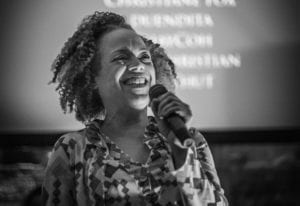 On 13 November, NYU Berlin hosted a workshop with composer, vocalist, multi-instrumental electronic musician, and multimedia artist Christina Wheeler. The workshop, GO WEST! OR EAST, SOUTH, OR NORTH! MOVING ABROAD AND CREATING A NEW LIFE AND CAREER IN MUSIC, addressed numerous practical components regarding relocating to a new country, including specific issues for women, non-binary people, and people of color.
On 13 November, NYU Berlin hosted a workshop with composer, vocalist, multi-instrumental electronic musician, and multimedia artist Christina Wheeler. The workshop, GO WEST! OR EAST, SOUTH, OR NORTH! MOVING ABROAD AND CREATING A NEW LIFE AND CAREER IN MUSIC, addressed numerous practical components regarding relocating to a new country, including specific issues for women, non-binary people, and people of color.
Multimedia artist Christina Wheeler has experienced first-hand how the native land of birth and upbringing frequently informs the cultural context and professional background in which artists develop. A new land and a new artistic community can offer inspiration and fresh resources for creative new work, and even for reinventing oneself aesthetically and professionally. Christina was able to lead the workshop in an effective and inspiring manner.
Thirty Years of Czech-American Relations: A Conference at NYU Prague
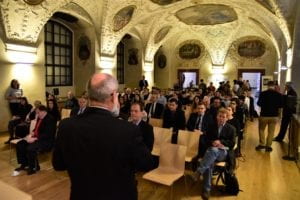 As the 30th anniversary of the Velvet Revolution approaches, NYU Prague took the opportunity to bring together academics, politicians, journalists, diplomats and students to reflect on the friendship between the Czech Republic and America. Gathered in a stunning Baroque Hall that is part of the Dominican Monastery in Prague’s Old Town, speakers were nostalgic, hopeful, and also trepidatious.
As the 30th anniversary of the Velvet Revolution approaches, NYU Prague took the opportunity to bring together academics, politicians, journalists, diplomats and students to reflect on the friendship between the Czech Republic and America. Gathered in a stunning Baroque Hall that is part of the Dominican Monastery in Prague’s Old Town, speakers were nostalgic, hopeful, and also trepidatious.
The conference was organized in cooperation with the Charles University Department of North American Studies and the nonprofit organization that Vaclav Havel founded, Forum 2000. It was spearheaded by NYU Prague professor Tomáš Klvaňa, a specialist in North American politics who has written several books about America, including The Trump Phenomenon.
The conference opened with a keynote speech by Jeffrey Gedmin who lived in Prague in the 1990s as the CEO of Radio Free Europe/Radio Liberty. He hearkened back to even earlier, when he was a “left-leaning student of the 80s” who travelled to the Soviet block looking for evidence of the ideals of a Communist society. “I found tyranny, secret police, environmental devastation, economic depression and suffering.” He warned about the American tendency to “not learn history,” noting that today, it is becoming mainstream on the left to say that it’s time to give Marxism a chance… and on the right to revisit the models of Pinochet and Franco to restore family values. “We have self-inflicted wounds in the USA. … Russia is in decline, but there are Russian experts interested in finding these wounds and dropping poison in them. “
This was followed by discussions involving fourteen Czech and American presenters who spoke on two panels: Coming Back Together: An Evaluation of Three Decades and Drifting Apart. The Looming Challenges in Transatlantic Relations.
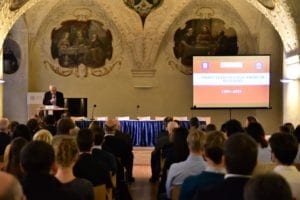 It’s hard to imagine a more qualified group for this topic. Speakers included former Czech Ambassadors to the USA, leaders of NATO talks, the former Czech Ministers of Defense and Foreign Affairs, the economic and political advisers to President Havel, career US diplomats, a correspondent from the Voice of America, and more. A wide array of topics were brought up, but a recurring theme was the importance of allies, not just partnerships that are about transactions. Today, many allyships seem to be under threat in tandem with an isolationist trend sweeping countries around the world.
It’s hard to imagine a more qualified group for this topic. Speakers included former Czech Ambassadors to the USA, leaders of NATO talks, the former Czech Ministers of Defense and Foreign Affairs, the economic and political advisers to President Havel, career US diplomats, a correspondent from the Voice of America, and more. A wide array of topics were brought up, but a recurring theme was the importance of allies, not just partnerships that are about transactions. Today, many allyships seem to be under threat in tandem with an isolationist trend sweeping countries around the world.
Of course there was quite a lot of nostalgia when remembering the ups and downs of the transitional years. Several speakers – both on the panel and in the audience (which included Czechs who have worked for American nonprofits and at the US Embassy) – thanked Americans for the values they brought. “The USA was instrumental in helping erode the Communist system by supporting civil society – funding nonprofits and educational initiatives. The USA didn’t have to choose to do this,” noted NYU Prague director Jiri Pehe. Alexandr Vondra, a former Czech Ambassador to the USA who was crucial in the effort to garner support for NATO, emphasized the ongoing importance of the military alliance between the two countries, while former Charge d’Affaires of the U.S. Embassy in the Czech Republic Mary Thompson-Jones focused on cultural exchange and how she believes the two countries understand each other thanks to their “mocking view of authority.” According to Michael Žantovský, also a former Czech Ambassador to the USA and the current head of the Vaclav Havel Library, the friendship between the two countries has been developing for much, much longer than 30 years: supposedly George Washington’s first girlfriend was Czech, but her father refused to let her marry a poor soldier.
The conference took place during the NYU Prague fall break, but some students decided to come back to Prague early so they could attend. One of them was Eli Lenner, a sophomore in Stern. “Learning about the relationship between the two countries from a Czech perspective … developed my understanding of where relations were in the nineties, where they are now, and where they might be in the future.”
As we saw thirty years ago, the future is hard to predict. “Things can change so quickly – think about how we were thirty years ago, how we were six years ago,” said Jeffrey Gedmin as he wrapped up his keynote speech. “And imagine where we can be in six years.”
Photo credits Kristýna Sluková
NYU Berlin, NYU Florence, NYU Prague Collaborate on Conference – Never-ending History – How did we get to 2019 from 1989?
 On October 16 and 17, 2019, NYU Berlin hosted a remarkable gathering of scholars that was both reflective and forward-thinking. The gathering being hosted in Berlin was meaningful as this year marks the 30th anniversary of the fall of the Berlin Wall. Directors from NYU Berlin, NYU Florence, and NYU Prague collaborated in making the occasion, organising the conference, Never-ending History: How did we get to 2019 from 1989?. This conference provided prominent thinkers to an opportunity to gather and consider a range of issues that have occupied academic and public debates, as well as the people who had lived on either side of the “Iron Curtain” and who became active or passive participants in the establishment of a ‘new’ European and global “post-communist” East. While the conference considered the global dimensions and significance of 1989, Never-ending History also addressed legacies of continuity and change in Germany, Poland, and the Czech Republic in politics, economics, and culture.
On October 16 and 17, 2019, NYU Berlin hosted a remarkable gathering of scholars that was both reflective and forward-thinking. The gathering being hosted in Berlin was meaningful as this year marks the 30th anniversary of the fall of the Berlin Wall. Directors from NYU Berlin, NYU Florence, and NYU Prague collaborated in making the occasion, organising the conference, Never-ending History: How did we get to 2019 from 1989?. This conference provided prominent thinkers to an opportunity to gather and consider a range of issues that have occupied academic and public debates, as well as the people who had lived on either side of the “Iron Curtain” and who became active or passive participants in the establishment of a ‘new’ European and global “post-communist” East. While the conference considered the global dimensions and significance of 1989, Never-ending History also addressed legacies of continuity and change in Germany, Poland, and the Czech Republic in politics, economics, and culture.
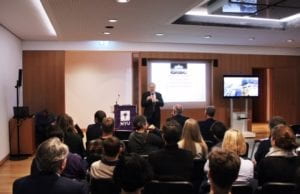 Professor Larry Wolff, NYU Professor of History and NYU Florence C0-Director, gave the keynote address, entitled Everyday Ecstasy: Revisiting 1989 in Sober Perspective and Double Exposure. His inspiring and interesting talk set the stage for the engaging presentations and provocative dialogues that ensued over the two days of this gathering.
Professor Larry Wolff, NYU Professor of History and NYU Florence C0-Director, gave the keynote address, entitled Everyday Ecstasy: Revisiting 1989 in Sober Perspective and Double Exposure. His inspiring and interesting talk set the stage for the engaging presentations and provocative dialogues that ensued over the two days of this gathering.
The impressive contributors and panels considered a wide range of topics that were organised into four lively panels: Internationalism, Nationalism, and Identity Formation in Post-1989 Europe; Aufarbeitung? Historicizing East Germany; Redrawing Europe; and Artists as Chroniclers and Storytellers of Political Change. These panel presentations and discussions considered issues as diverse as the successes and failures of liberal democracy and market economy in former Communist/Socialist countries and visions of citizenship and nationality, the impact of the transitions on women and minority groups and media, arts, and culture in post-Communist societies, the resurgence (or continuity) of authoritarianism and nationalism and changing concepts of grassroots democracy / social movements in an age of populism and social media.
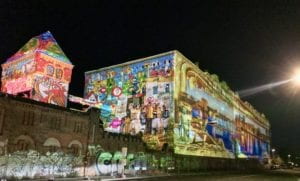 NYU Professor of History Mary Nolan delivered an inspiring closing keynote address. Professor Nolan’s impressive scholarship is focused on Europe and America in the Twentieth Century, the Cold War, the history of Human Rights, the global economy in the twentieth century, modern German history, and European women’s history. Her closing keynote, Women and Gender Politics since 1989, was a stirring commentary on how women, gender, and politics have featured in political and social debates Europe over the last thirty years.
NYU Professor of History Mary Nolan delivered an inspiring closing keynote address. Professor Nolan’s impressive scholarship is focused on Europe and America in the Twentieth Century, the Cold War, the history of Human Rights, the global economy in the twentieth century, modern German history, and European women’s history. Her closing keynote, Women and Gender Politics since 1989, was a stirring commentary on how women, gender, and politics have featured in political and social debates Europe over the last thirty years.
While it is hard to distill two days of dynamic conversation into themes, NYU Prague Director Jiri Pehe, noted the discussions suggested that “there seem to be similar developments in all post-communist countries, which seems to suggest that we need to look for most answers to what is now going on in the region in the era before 1989.” NYU Berlin Director Gabriella Etmektsoglou described the conclusions being drawn, by Mary Nolan and others, as “path-breaking work”.
NYU Washington, DC and the Irish Network DC Partner on Dynamic Program – Northern Ireland Peace on the Eve of Brexit: Resilience & Reconciliation Through Art & Storytelling
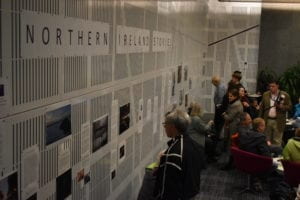 NYU Washington, DC and the Irish Network DC recently launched a three-part collaboration entitled Northern Ireland Peace on the Eve of Brexit: Resilience & Reconciliation Through Art & Storytelling. This programming is an exploration featuring music, film, and discussions, supported by a two-week art installation examining conflict and cooperation during the Troubles and since.
NYU Washington, DC and the Irish Network DC recently launched a three-part collaboration entitled Northern Ireland Peace on the Eve of Brexit: Resilience & Reconciliation Through Art & Storytelling. This programming is an exploration featuring music, film, and discussions, supported by a two-week art installation examining conflict and cooperation during the Troubles and since.
The 30-year social, religious, tribal, and economic conflict known as the Troubles came to a formal end with the Good Friday Agreement of April 1998, but now Brexit threatens that fragile peace. Through film, music, art, storytelling and special guests, NYU Washington, DC and the Irish Network DC will explore the complex progress of healing a divided society. A visual art exhibit will showcase art about the conflict and its legacy and will run from October 16-30, 2019. All events will be at New York University’s Constance Milstein and Family Global Academic Center located in downtown D.C.
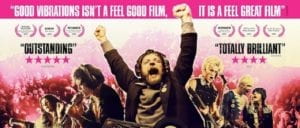 The program was launched with “Good Vibrations” Film Screening and Discussion on 17 October.
The program was launched with “Good Vibrations” Film Screening and Discussion on 17 October.
Set in the 1970s, the film “Good Vibrations” looks at the life of Terri Hooley, who is considered Northern Ireland’s “godfather of punk.” Due to the sectarian violence in Belfast at the time, the city basically shut down in the evenings. This was not much fun for the teens looking for something to do. Hooley began arranging punk music shows, set up a record label and shop called Good Vibrations, and ‘discovered’ the band The Undertones. The punk community became a way to rebel against the sectarianism and violence that was prevalent.
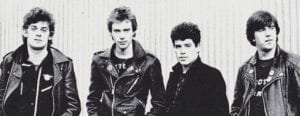 On 24 October, NYU Washington, DC will host “Alternative Ulster” Acoustic Performance and Discussion” featuring a performance by guitarist. Henry Cluney. Henry Cluney grew up in Belfast and was a founding member of the Belfast punk band Stiff Little Fingers. The band, comprised of Catholics and Protestants, wrote about the situation in their country. Some of their songs include “Tin Soldiers”, “Suspect Device”, “Wasted Life” and “Alternative Ulster”. Henry will tell stories about his songs, living through the Troubles and, with his guitar, perform some of those songs. Joing Henry for a discussion after his performance is Niall Stanage, Associate Editor and White House Columnist for, The Hill. Henry will be available to sign autographs and chat after the show.
On 24 October, NYU Washington, DC will host “Alternative Ulster” Acoustic Performance and Discussion” featuring a performance by guitarist. Henry Cluney. Henry Cluney grew up in Belfast and was a founding member of the Belfast punk band Stiff Little Fingers. The band, comprised of Catholics and Protestants, wrote about the situation in their country. Some of their songs include “Tin Soldiers”, “Suspect Device”, “Wasted Life” and “Alternative Ulster”. Henry will tell stories about his songs, living through the Troubles and, with his guitar, perform some of those songs. Joing Henry for a discussion after his performance is Niall Stanage, Associate Editor and White House Columnist for, The Hill. Henry will be available to sign autographs and chat after the show.
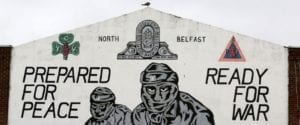 The third and final program co-hosted by NYU Washington, DC and the Irish Network DC will take place on 30 October and features an evening discussion and stories about life in Northern Ireland, the peace process and Brexit. Entitled Looking Ahead: Beyond the Toubles and Brexit, to Protecting the Peace, the event is a fitting conclusion to this dynamic program.
The third and final program co-hosted by NYU Washington, DC and the Irish Network DC will take place on 30 October and features an evening discussion and stories about life in Northern Ireland, the peace process and Brexit. Entitled Looking Ahead: Beyond the Toubles and Brexit, to Protecting the Peace, the event is a fitting conclusion to this dynamic program.
Guest speakers for the evening include Margery Myers, Widow of Robert P.Myers, Jr. (US Consul General Aug. 1986 – April 1989) and Aideen Gilmore, formerly with Committee on the Administration of Justice (CAJ) in Belfast. The keynote speaker is the Irish Ambassador to the United States, Daniel Mulhall, who will talk about the role of the arts in Ireland, Peace Process and what Brexit may bring.
A Half Century in Paris: A Look into the Past and a Glimpse of the Future
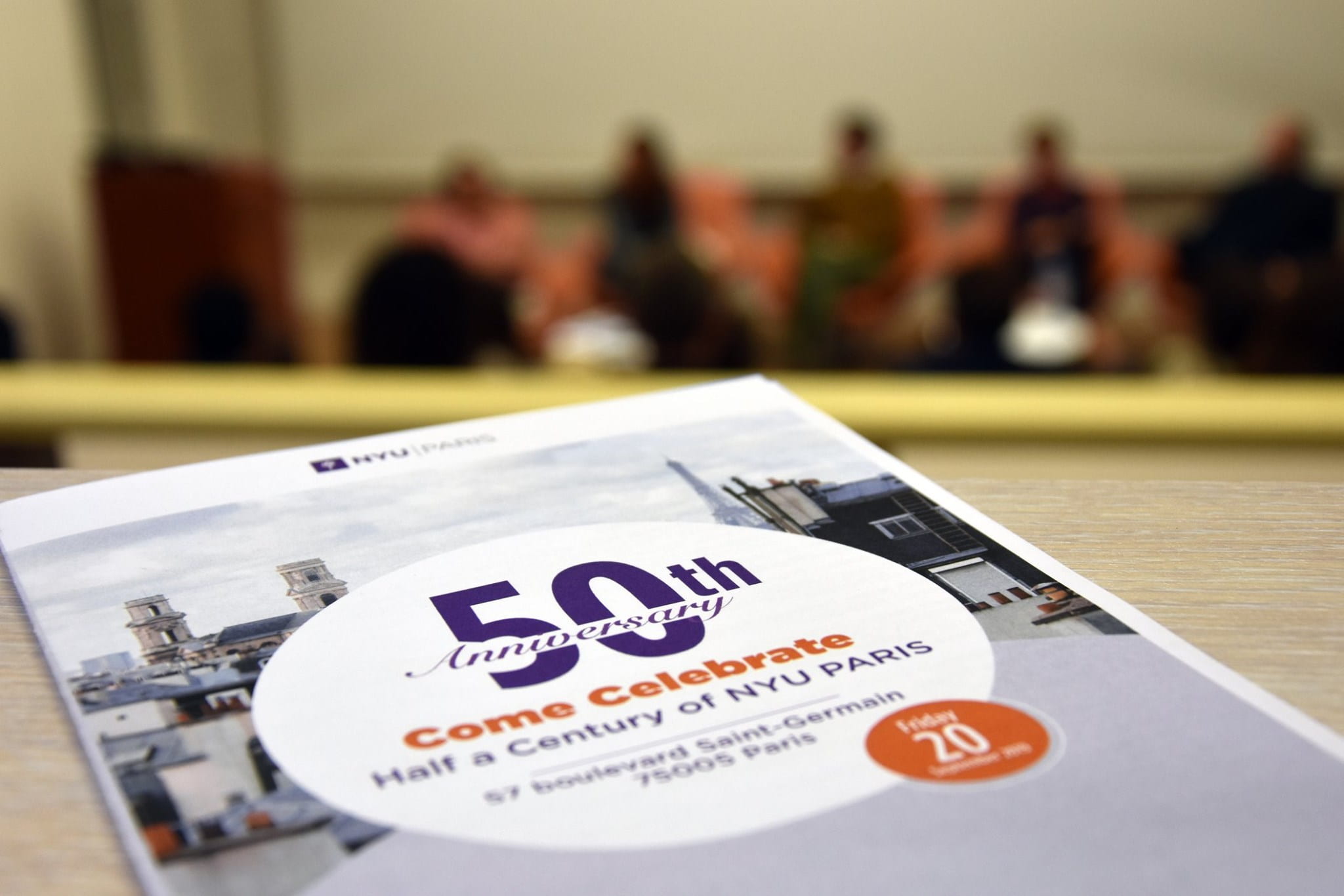
To celebrate its 50th anniversary last month, NYU Paris held a day of commemorative events designed both to provide a view into the past, and to ponder the site’s future, including the potential for new academic opportunities and collaborations. The event brought together key figures involved with different phases of the site’s growth, current and past faculty, students, and staff as well as colleagues from American universities with programs in France, including the American University in Paris, the University of Chicago, Brown University, and Columbia University.
Linda Mills, Vice Chancellor and Senior Vice Provost for Global Programs and University Life, kicked off the day by acknowledging the site’s history, and linking the past to the present. “As the second oldest site in NYU’s global network, NYU Paris has been a defining feature of our global identity and has become a key element of what makes NYU the leading global institution it is today,” said Mills. “NYU Paris is a beautiful expression of what the world needs – one that is inextricably tied to its environment, steeped in its host city’s culture and context, offering unparalleled academic and scholarly experiences to a wide range of faculty and students.”
In attendance were several individuals who have played critical roles in the establishment and operation of NYU Paris over the past 50 years: Tom Bishop, professor of French Literature, Thought and Culture, and a driving force in the creation of NYU Paris; Judith Miller, professor of French Literature, who served as Director of the NYU Center in Paris from 1998 to 2003; Benoît Bolduc, also a professor of French Literature, and the Director of NYU Paris from 2015 – 2018; and the current site director, Alfred Galichon, professor of Economics and Mathematics
NYU Paris is a beautiful expression of what the world needs - one that is inextricably tied to its environment, steeped in its host city’s culture and context, offering unparalleled academic and scholarly experiences to a wide range of faculty and students Linda Mills
Recalling the early history of the site, talks during the opening panel focused on memories and reflections on the founding of NYU Paris in 1969, at a time when it was less common to cross an international border while pursuing a degree – and talk of establishing NYU’s global network was still some 40 years away. Miller, Bolduc, and Galichon, traced the academic roots of the site in the study of French language and culture.
NYU Paris opened its doors during a “glorious time for French studies, “ said Miller, “many post-war thinkers had not yet been translated to English,” so it was important to understand French. “Knowledge has since shifted from the philosophical terrain to a way of thinking that acknowledges global and digital interactions.” Reflecting this expansion, during her tenure as site director, NYU Paris opened its Anglophone program, “welcoming students who were not French majors but became French minors.” On the experience of learning a new language and culture in situ, Miller explained, “you learn from a “different” world around you, and have to figure out how to live with it.”
The panelists emphasized the importance of shaping the minds of global citizens engaging in the local terrain. “We’re sending students to Paris, not the moon,” said Bolduc “and we need to ensure our academic programming reflects the unique nature of that experience.” Shedding light on current academic and cultural initiatives, Galichon detailed “the expanding academic opportunities at the site, including course offerings that have resulted in new populations of students being drawn to the study of the French language. A good example is computer science students who have traditionally been less likely to even take a course in France. As a result of earning credits for their major in Paris, some computer science students have found that their immersive experiences in France have sparked new interests, with some choosing to complete minors in French. And the number of these types of students is increasing.”
In a panel later in the day,The Next 50 Years of NYU Paris: What’s Next?, Sana Odeh, Clinical Professor of Computer Science, explained that “Paris’ position as a hub for mathematical and scientific inquiry, combined with the flourishing entrepreneurial culture draws global talent and has created a range of opportunities. Studying in a world capital with an inspiring environment, and taking [Computer Science] special topics and high-level courses makes NYU Paris a wonderful location for computer science students.”
Enlarge
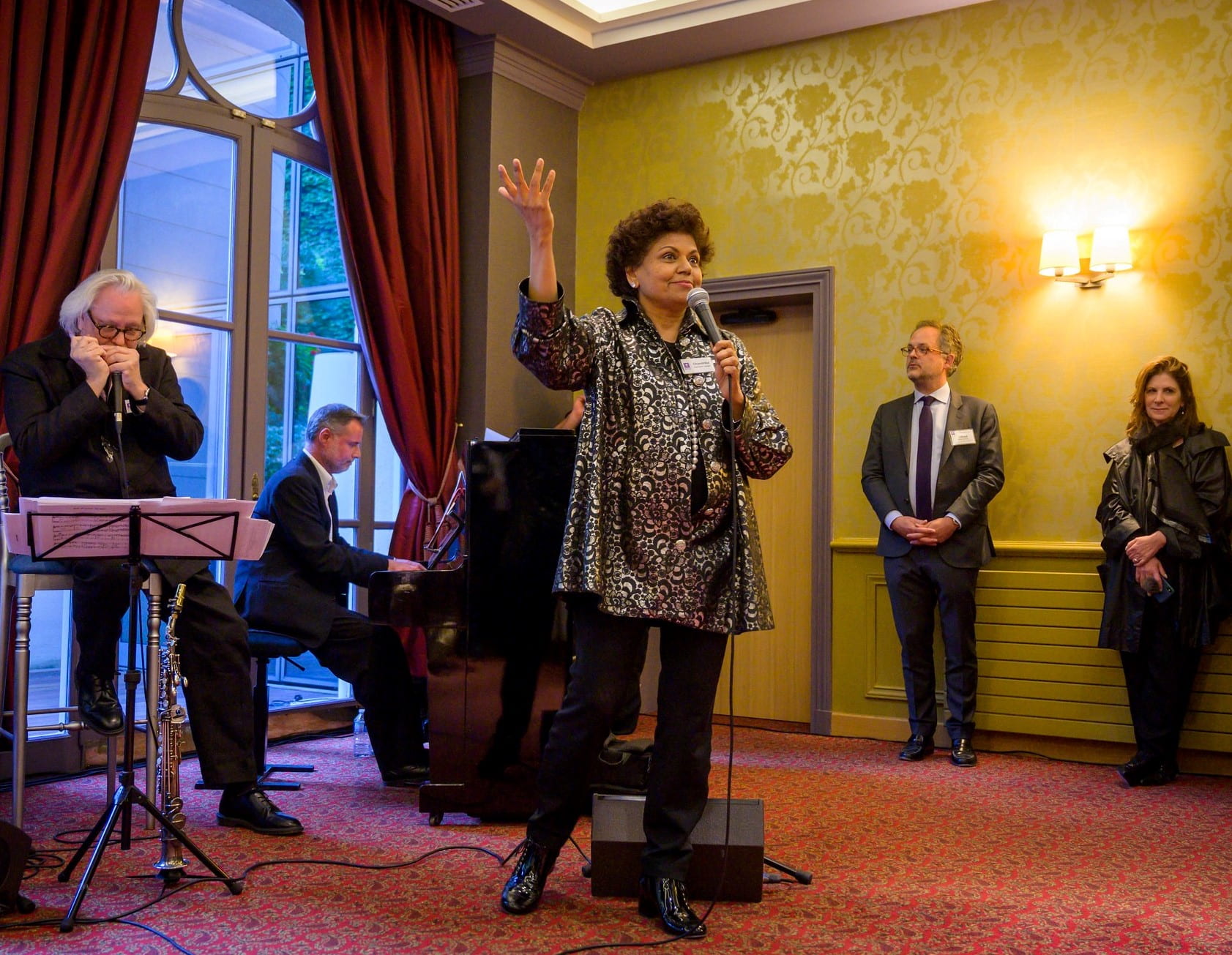
Galichon also highlighted upcoming initiatives in store for NYU Paris. “In collaboration with colleagues in the French department, and following the masterclass format developed for doctoral students, a new set of masterclasses are on the horizon,” he said, accompanied by panelists who included Phillip Usher, Associate Professor and Department Chair, French Literature, Thought and Culture, François Noudelmann, Professor of French Literature and Director of the Center for French Language and Cultures, and Linda Mills. “French faculty from New York will come once per year,” said Usher, “to deliver short-term intensive courses related to their research. The topics will rotate each semester and the first course will cover cinema, myth, and politics. Increasing engagement with the broader community, enrollment will be opened up to local PhD students from French universities.”
In conjunction with the celebration, photos that are only rarely viewed outside of the archives were on full display, including those documenting the student experience, staff over the years, and trips taken by the NYU Paris community. The exhibit also included shots of NYU Paris literary events and avant garde activities featuring Eugène Ionesco, and other well known French writers and politicians.The exhibition also included student works, including student-shot videos captured on iPhones in an experimental film class.
The day ended with a cocktail reception at Hotel des Arts et Métiers, which included guests such as NYU President Andrew Hamilton, Gene Jarrett, Dean of the College of Arts and Science, Jeffrey Lehman, Vice Chancellor, NYU Shanghai, Antonio Merlo, Dean of the Faculty of Arts and Science, and NYU Trustee and President’s Global Council Chair Chandrika Tandon.
NYU Washington, DC Salon Series with Dr. Jennifer Natalya Fink
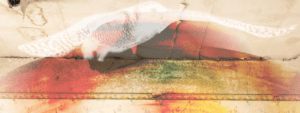 On February 12, NYU Washington, DC will host a Salon Series conversation with Dr. Jennifer Natalya Fink, author of the Catherine Doctorow Prize-winning novel, Bhopal Dance.
On February 12, NYU Washington, DC will host a Salon Series conversation with Dr. Jennifer Natalya Fink, author of the Catherine Doctorow Prize-winning novel, Bhopal Dance.
On the night of December 2, in the midst of the Reaganomic era, an explosion at an American-owned factory in Bhopal, India, released untold amounts of toxic gas on uncounted numbers of people, creating a human and environmental disaster of insurmountable proportions. Known as the Bhopal disaster, it once dominated international headlines, and is now barely remembered.
Yet Bhopal remains emblematic of all the many quickly forgotten disasters that followed, and of the permanent state of globalized disaster in which people now dwell. What does it mean when corporations instead of states control not only the means to create environmental disasters, but also the tools to bury them? How does one revolt against these unelected entities? How do the most private desires get shaped by this stateless horror? Jennifer Natalya Fink’s Bhopal Dance is an epic and epochal tale of such a horror and its buried consequences.
NYU DC faculty member, Victoria Kiechel, will serve as interlocutor for this evening of discussion.
